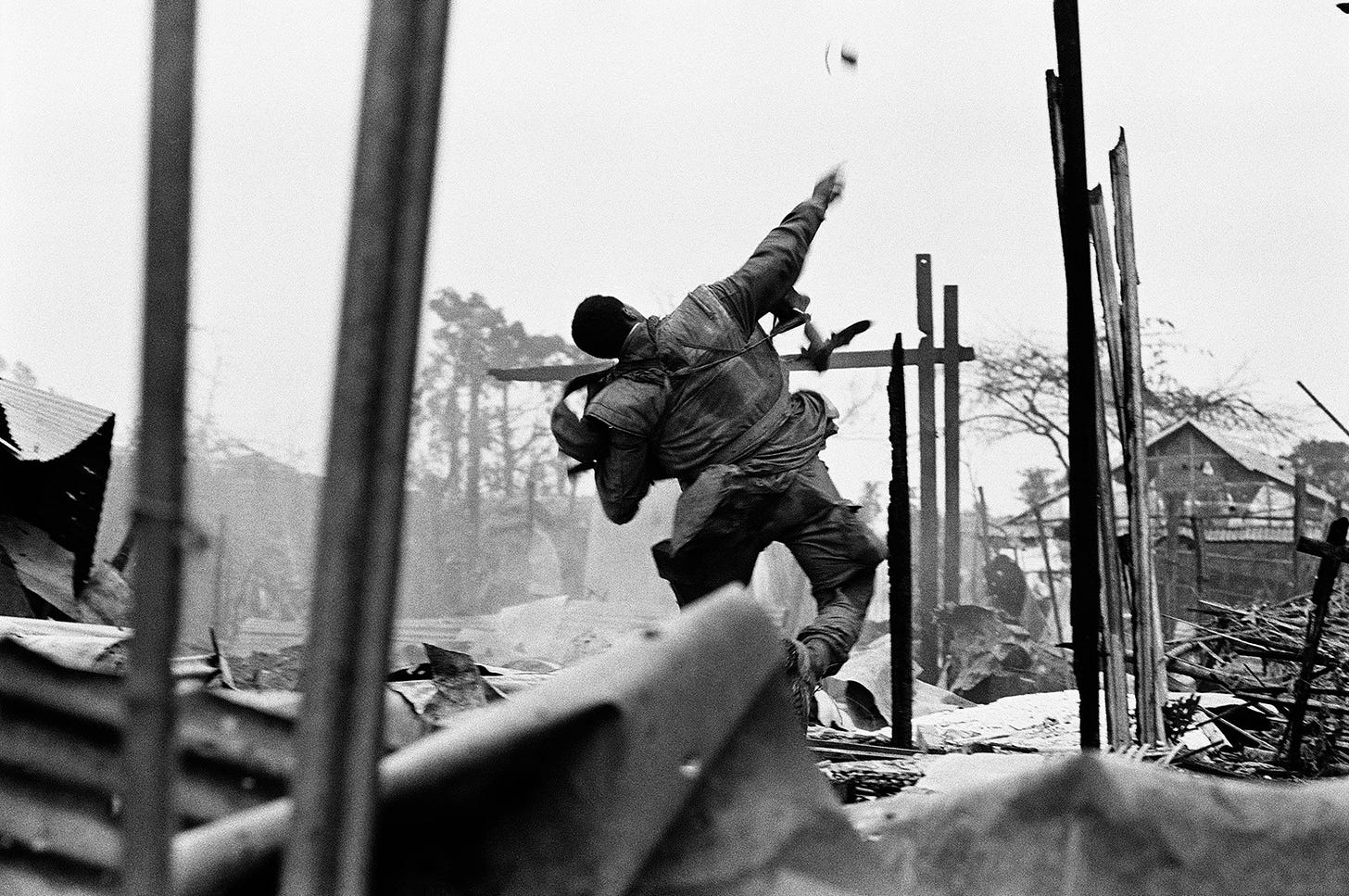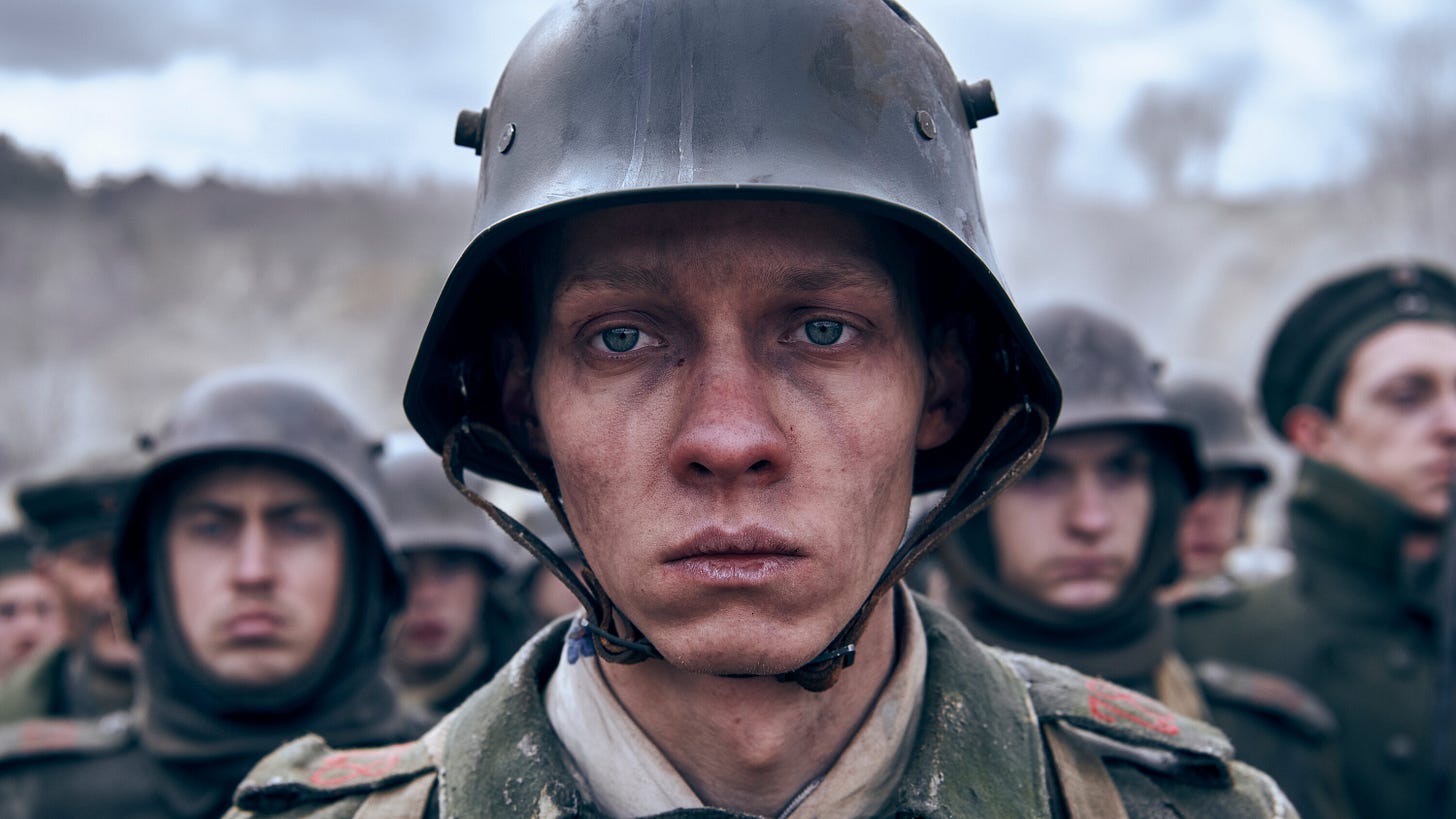All Quiet on the Western Front
Ukrainian trenches, war photographer Don McCullin, and alternative perspectives from art
Last week I watched All Quiet on the Western Front, the film that has been nominated for gazillions of awards at the Oscars. It is one of those deeply uncomfortable movies, and it has been knocking around in my head ever since I saw it.
The film is based on the 1928 novel by Erich Remarque, a German veteran of World War I, and tells the story of the physical and psychological traumas that ordinary soldiers suffered in the trenches of the Great War.
It is not for the faint-hearted. The movie opens with a graphic, sickening scene of mass slaughter as young men are gunned down and blown apart by the heavy weaponry that is a feature of modern, mechanised war. It depicts killing on an industrial scale. And so it continues throughout the film, with no happy ending. There’s no heroism, which is a feature of most war films. Rather, it depicts the meaningless carnage and total insanity of war.
It’s fictional in terms of the plot and its characters. But the depiction of trench warfare is not fictional. Most of us can only imagine the brutal realities of war and this film helps us get part of the way to understanding what it might have been like for the soldiers who experienced the fighting in World War I.
There are many things to say about this film - about the role of incompetent leadership, propaganda, the concept of heroism and blind patriotism, and many other aspects of war. But I want to reflect briefly on one thing in particular that occurred to me as I was watching it. That is, the realities of war that we don’t see today in the Western mainstream news media. It’s all sanitised for the viewing and reading public now. It enables us to look the other way, to ignore the grim facts of distant war.
It makes me think about the work of the British photographer Don McCullin, who spent most of his career documenting wars in Africa, Asia and the Middle East from the early 1960s to the 2010s. For many years he worked for The Sunday Times, sending back graphic photos of soldiers and civilians in the heat of battle and in its aftermath. In his photos readers saw unflinching images of dead bodies, wounded bodies, mutilated bodies. Images of torture, cruelty, grief. In McCullin’s words he wanted to ‘wake people up to what was going on’. But the moral lines are often blurred in his photography.
McCullin was at one time the leading war photographer of his generation. His photographs serve both as documentary records and as works of art because they demand reflection from the viewer. Through the aesthetics of his images - the framing, the light, the perspective and focus, McCullin emotionally connects with his subject matter. He’s not a remote onlooker with a camera, he’s present in that moment as an active participant. McCullin describes it like this:
Photography for me is not looking, it’s feeling. If you can’t feel what you’re looking at, then you’re never going to get others to feel anything when they look at your pictures.

This photograph from the battle for Hue in 1968 during the Vietnam War depicts an American soldier launching a hand grenade at the enemy. The body of the soldier is perfectly framed in the centre between vertical poles of war detritus and his pose is like that of an athlete on the sports field throwing a javelin. It’s almost heroic, except that grenade probably killed someone. The aesthetics draw the viewer in to stay with the image and to think about it. Moments later McCullin witnessed the soldier’s hand being blown apart by gun fire.

In this image McCullin photographed three US soldiers tormenting a civilian in Hue during the same battle in 1968. The marines stand in a semi-circle towering behind the helpless blindfolded Vietnamese man on his knees, their faces showing no emotion. The viewer is left to wonder what happened next.
Things changed for McCullin when Rupert Murdoch took over the Times Newspaper Group in 1981. Work dried up for him on that publication. His hard-hitting photographs from war-torn locations were no longer featured in The Sunday Times Magazine because they weren’t great for generating advertising revenue. The new editor Andrew Neil shifted the focus of the magazine to lifestyle and consumption.
At about the same time McCullin was also excluded from the press contingent accompanying British soldiers to The Falklands War. McCullin has talked about the free rein he was given as a war photographer embedded with soldiers in the early years of his career, particularly during the Vietnam War. But his photos contributed to the shifting of public opinion against the war, and after that, he says, the rulebook was re-written. Now you can’t go anywhere as a photographer with Western troops without being totally controlled.
As I was watching All Quiet on the Western Front I also thought about the many resonances it has with the Russia-Ukraine conflict today, much of which is being fought in WWI-style trenches in Eastern Ukraine with young, inexperienced conscripts on both sides. We only see part of the picture of this war via our news media, which makes the visual power of films like All Quiet on the Western Front all the more important for reflecting on the inhumanity of war and its impact on individuals, whichever side they’re on. It raises collective awareness of the dangers we all face from authoritarianism in our world and the imperative to keep striving for political solutions.
Have you seen All Quiet on the Western Front? If so I’d love to know your thoughts on it, and on any of these ideas.



I saw this film on Netflix last week too. I could barely get through it but I forced myself to. It's interesting that it's from the perspective of the Germans, who in Western historiography have been painted as the baddies in WWI. They invaded Belgium in 1914 so they were the aggressors, just like Russia is now. This film moves away from who's to blame though, which I think is really interesting. It's just simply about the dehumanising impact of war on those who are in it. Thanks for the intro to Don McCullin, I didn't know his photography. I've just clicked on his website. Amazing work.
Thanks Victoria, I haven't watched the film but it put me in mind of my recent MA dissertation, which was based around the WW1 nursing memoirs of Mary Borden and the way she wrote about the mutilation of male soldiers. Shocking enough to research; not sure if I can brave a film.
Look forward to checking out your new podcast! Good luck with it : )